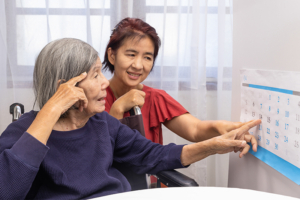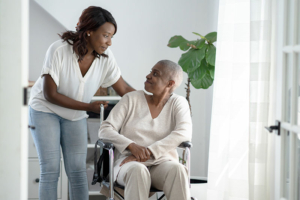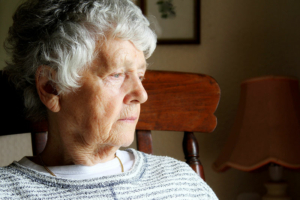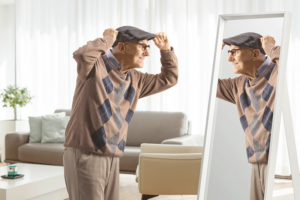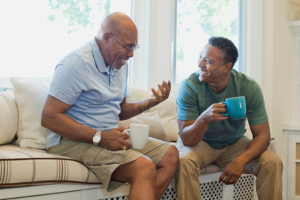How to Boost Self-Confidence for Someone With Dementia

Boost self-confidence for someone with dementia with these empowerment tips.
Common small successes for a person with dementia—like tying their own shoes or fixing what they want to have for lunch—can feel monumental. These experiences boost self-confidence for someone with dementia while strengthening their sense of identity in the middle of the difficulties they are facing. One important part of taking care of a senior loved one with dementia is to foster these opportunities, preserving the joy and dignity of independent living. Here are some tried-and-true tools to help.
Create a Supportive Environment
Ensure the person’s home is safe and easy to get around. Small modifications, such as installing motion-sensor lights for better visibility at night and securing loose rugs, can help prevent falls and boost confidence. Introduce tools that streamline daily tasks—like ergonomic kitchenware that’s easier to hold—to help them feel competent and in control. Adding clear labels on drawers and cabinets can also guide them more easily through their day-to-day routine, decreasing confusion and promoting independence.
Break Up Tasks
Tackle daily activities with patience and creativity. For example, if getting dressed independently becomes a problem, organize clothes in a sequence that makes it easier for them to understand and select outfits. Choose clothing with elastic waistbands or magnetic buttons to lessen frustration. Every small step they can do by themselves is a boost to their self-esteem. Providing visual aids or step-by-step instructions for more complex tasks can also help them maintain autonomy.
Promote Regular Exercise
Exercise is a cornerstone of healthy living for all of us. Motivate your loved one to engage in doctor-approved exercises that are enjoyable and safe, like short walks in the park or light stretching at home. Adapt the intensity according to their ability, focusing on fun and the sense of accomplishment. Encourage regular schedules to help them build a routine that includes physical activity to enhance both their mobility and mood.
Leverage Helpful Technology
Utilize technology designed to maintain independence. Think about devices like simplified phone applications and GPS trackers which help manage everyday life without overwhelming them. These tools offer peace of mind to you both, ensuring safety while respecting their need for independence. Smart home devices that can control security, lighting, and temperature with simple commands can also improve their living environment and provide extra comfort.
Engage With Empathy
Empathy goes a long way when caring for someone with dementia. Validate their perspectives and feelings, whether or not they are different from your own. Engaging in their reality helps decrease their stress and helps them feel respected and understood, strengthening their sense of self-worth. Regular, open conversations can help establish trust while making them more at ease in expressing their emotions and needs.
Fostering independence for someone with dementia improves their lives. Celebrate each victory, regardless of how small it might appear. It can truly make a significant difference!
Our dementia care experts, serving Fort Lauderdale, Lighthouse Point, Deerfield Beach, and the surrounding areas in Broward County, have additional tips to offer along with skilled hands-on care to help the person you love live their best life. We are just a phone call away at 954-486-6440.







